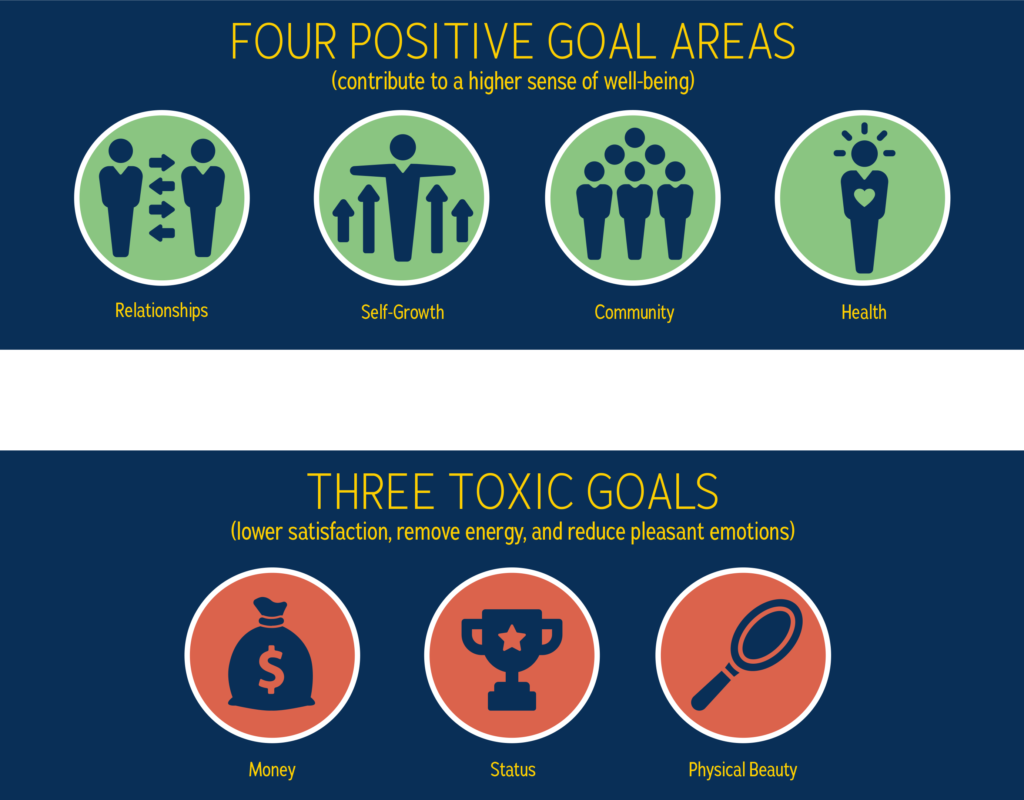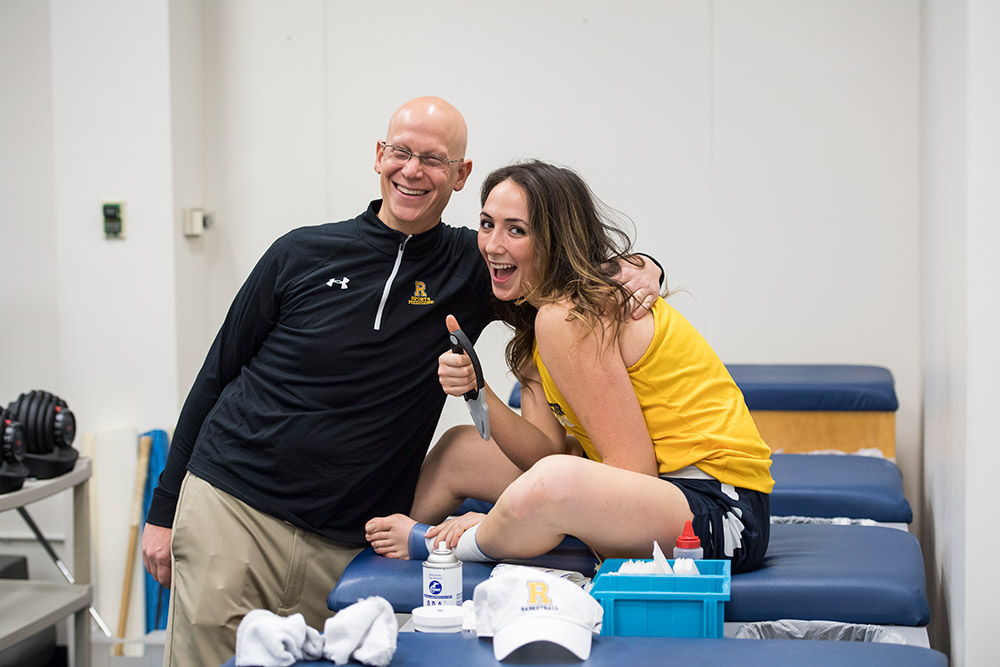A new year is approaching, and with it will come a clean slate and a list of resolutions.
Lose weight. Get in shape. Do better in school. Stop smoking. Budget time—or money—better.
We asked University experts for tips on how to make some of the most popular resolutions a reality in 2017.

All New Year’s resolutions are not alike. As reported by the Canadian Broadcast Corporation last year, psychologists Richard Ryan from the University of Rochester, and Tim Kasser, now with Knox College, tell us in their landmark paper that goals in four areas contribute to a higher sense of well-being.
Some resolutions, however, depend on external factors and can actually breed dissatisfaction and increase both anxiety and depression. They identified three goals as especially toxic.

“This year I will get into shape.”
Eric Rozen is in his 15th year as head athletic trainer in the University’s Department of Athletics and Recreation. He oversees the health and safety of hundreds of student athletes and, along with his staff, provides injury evaluation, care, maintenance, and rehabilitation.
If you want to get in shape in 2017, Rozen says the first step before embarking on any rigorous exercise plan is to consult with your physician. Once you’ve done that, he offers these additional guidelines:
- To lose weight, it’s still calories in, calories out. If you burn more calories than you take in, you’re going to lose weight. It’s that simple. People talk about how they’re going to go on a protein diet, or a carbohydrate diet, or they won’t eat after 9 p.m. It’s still a matter of what you’re putting into your body, and what you’re expending. About 3,500 calories make up a pound. If you have a deficit of 500 calories a day, that’s a pound a week you’re losing. That’s a healthy amount.
- Making small changes in your diet will give you a better sense of success and keep you motivated. If you can say “This week, I’m not going to eat dessert after dinner, or substitute a healthier option at lunch, that’s a good start. Setting realistic dietary goals is important, to avoid being discouraged, to not always feel like you are cheating. It’s about balance and making good choices.
- When you start an exercise plan, start out slowly. People have a New Year’s resolution: I’m going to exercise. I’m going to join a gym and work out. They’re all gung ho. So they go out and overdo it. And the next day, they’re miserable. And then they just lose interest. When you start out slowly and build up gradually, you can start to enjoy the exercise and feel better over time.
- Finding the right activity will help keep you motivated. Find an activity that you can enjoy alone, or with the whole family. Also, try to find a life-long activity. You don’t have to do a five-mile run. It’s about being active, just moving.
- Being creative with exercise is crucial in the winter months. The weather is cold. What can you do when it’s bad outside? You don’t want to go for a walk. But there’s always a way to exercise. I see a guy in [the Goergen Athletic Center] all the time. He has his book with him, or his headphones on, and he walks from one end of the building to another. He’s moving. It’s great.
Don’t focus on the scale
You’ve stuck to a healthy diet and worked out religiously. You’re feeling energetic and no longer have shortness of breath or aching legs.
Then, you step on the scale and realize you haven’t met your weight-loss goal.
No worries, says Michael Washington, a fitness specialist and personal trainer at the Medical Center’s Fitness & Wellness Center.
“You can’t make weight your primary goal,” he says. “You may do all the things necessary to get yourself in shape and then find you haven’t lost the 50 pounds you set as a goal.”
Washington, who has been at the University for nearly 20 years, stresses that many factors affect what a person weighs.
“People are dealing with medications, or hormone imbalances that stop them from getting to the weight they desire,” he says. “Your plan should be to get healthy and fit enough to accomplish your physical goals on a regular basis.”
Washington says a key to getting healthy is exercise, no matter how low impact or minimal it may be.
“I tell people, ‘Get up and raise your sedentary heart rate several times a day.’ That’s the activity that is going to get your biometrics in shape. If you never lose weight, you’re still going to a healthier person for it.”
“This year I will do better in school.”
 There’s a wealth of resources at the University to help students who are falling short of their goals.
There’s a wealth of resources at the University to help students who are falling short of their goals.
First, there are the individual faculty members. Jim Zavislan ’81, ’88 (PhD), once a Rochester student himself, is the associate dean of the Hajim School of Engineering & Applied Sciences, and has been teaching full time for nearly 15 years. He says the most important single piece of advice he offers students is to approach their education as “a full-time job.”
There are also professional advisors, such as Kelly Johnson, an academic counselor in the College Center for Advising Services (CCAS), who serves students in the Hajim School. She says it’s important for students to “zero in on the shortcomings that are holding you back,” and then make use of resources available.
Zavislan and Johnson each offered a list of concrete tips for improving academic performance in the new year.
Tips from Kelly Johnson
Academic Counselor, College Center for Advising Services
- Is it a question of study skills? Learning style? Test-taking? The Center for Excellence in Teaching and Learning (CETL) offers tutoring, study skills consulting, and study groups. All services are free to Rochester students.
- Are you taking too many courses? Talk to a counselor in CCAS, the undergraduate coordinator in your department, or your faculty advisor about creating a more realistic schedule that still allows you to complete your degree. You may not need that second major that you think is necessary for your future job.
- Time management is critical, especially if you are involved in extracurricular activities. If you’re not using a paper planner, take advantage of apps like Google calendar that let you enter the deadlines from a course syllabus. It helps to get a reminder that a midterm is coming up in, say, two weeks, so you can start reviewing in advance, instead of cramming at the last minute.
- Don’t be afraid to talk to each of your professors—at least once a semester—and show them you’re serious. When professors know you’re making an effort, that could mean the difference between a B- and a B for a student on the cusp. At the very least, attendance is key. And, of course, put away the cell phone, and if you use a laptop, use it only to take notes.
- Develop your own “board of directors.” Just like a CEO of a company or a nonprofit needs a board, students benefit from at least four or five people whom they can turn to. It might be your faculty advisor, if you have questions about your major; an advanced student mentor, or someone in residence life, to help you sort through tough decisions; or a parent or family member you can talk to when you’re feeling a lot of stress. Knowing you have people at your fingertips—and that you’re not alone—can be the most helpful thing of all.
Become a stronger writer
Deborah Rossen-Knill, founding director of the Writing, Speaking, and Argument Program, is an associate professor who holds both a master of fine arts in fiction writing and a doctorate in English. “We are all writers, no matter one’s discipline or future profession,” she says. To continue to develop as a writer (a life-long pursuit!), she suggests joining a writing group, or even creating your own group.
“Organize about four to five people for a block of time that you devote to writing,” she says. “This is a time without distraction, for each person to set a writing goal, work on writing, and then reflect on their writing progress. It’s a simple concept, but it keeps you focused and accountable—and it makes writing fun.”
The Writing, Speaking, and Argument Program helps undergraduate and graduate students improve their communication skills through courses, writing groups, tutoring, and special events.
“This year I will overcome my fear of public speaking.”
Curt Smith, a senior lecturer in the Department of English, served as a speechwriter for President George H.W. Bush and teaches a course in public speaking at the University. “We live an age where unless you can communicate, you are at an enormous disadvantage,” he says.
President Ronald Reagan, who was often called “the Great Communicator,” once offered Smith this advice: “If you give someone 15 statistics in a speech and the story is told well, the audience will remember the story,” Smith recalls.
Aside from having good material, there are some basic rules about delivery. For example, eye contact is paramount. He also suggests making use of your hands. “Don’t put them in your pockets or behind your back,” Smith says. At the same time, he cautions against trying gestures that are unnatural for you.
“Find out what gestures are good for you. Don’t try for a last minute extreme makeover. If you don’t feel natural, your awkwardness will be contagious, and the audience will feel it.”
And as with any skill, Smith says, another key is “practice, practice, practice.”
Try something new
Nigel Maister, the Russell and Ruth Peck Artistic Director of the International Theatre Program. “The nervousness and self-consciousness that takes over when one is asked to speak in public is a common insecurity, he says.
“Even actors are not immune to it as stage fright will attest. But being involved in the theatre and understanding how actors go about presenting themselves to an audience, night after night, might be a good way to master the skills involved in public speaking. Even taking an acting class would be a great way to break the ice.”
Auditions for the International Theatre Program’s two spring semester shows will be held on Friday, January 20 and Saturday, January 21. There is no prior theatrical experience necessary to audition, and if you’re cast, you are eligible for a minimum of 4 English credits.




